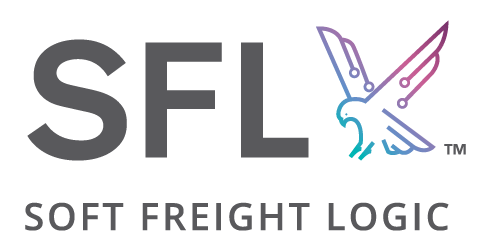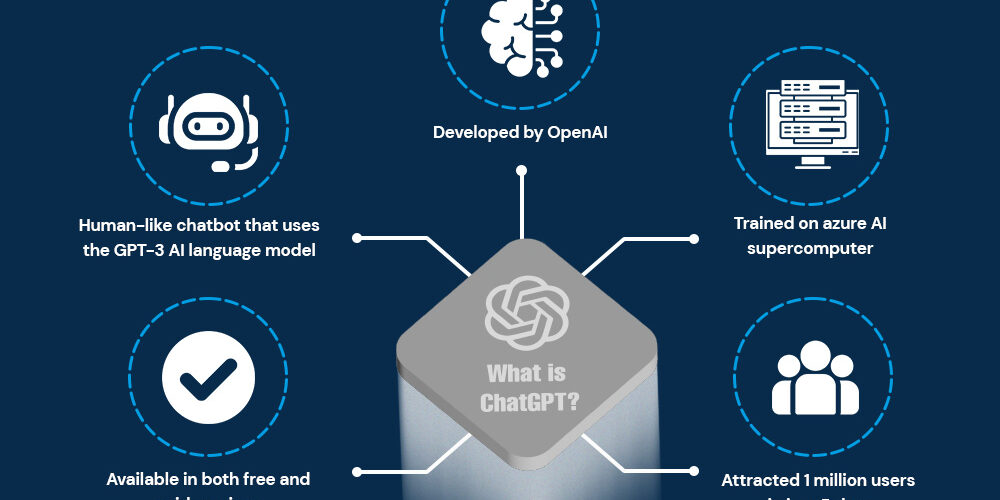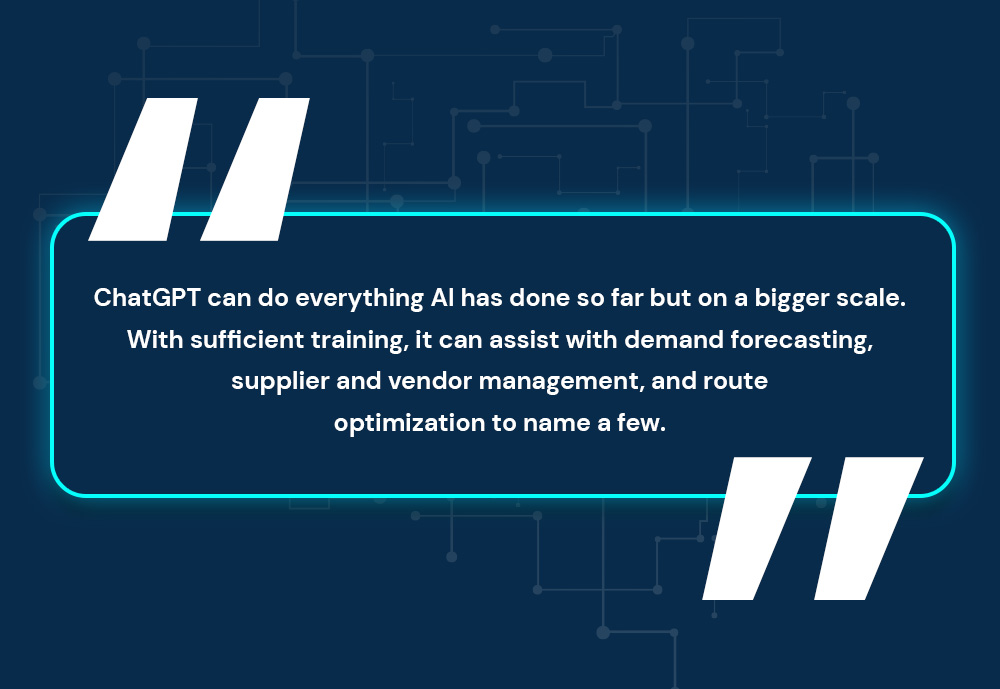
To say that the introduction of ChatGPT has caused quite a stir would be an understatement.
Social media screams ChatGPT with everyone having a say about the latest development in the AI space.
But enough about “will ChatGPT take my job”. From a B2B perspective, what are the enterprise use cases of ChatGPT?
A well-known example is Microsoft incorporating ChatGPT into Bing, its search engine, and its Office Suite.
But what other potential applications does ChatGPT offer for a business? How will ChatGPT influence supply chain operations in the future? What integration capabilities does it provide to streamline complex supply chain systems?
Conversations around AI as a useful technology are popular among businesses. In a previous blog, we identified Artificial Intelligence(AI) as one of the top four digital trends of 2023 in the supply chain industry.
And looking at the immense hype around ChatGPT and its impressive ability to understand natural language and generate human-like responses – it’s safe to say that more businesses are talking about AI and its benefits to their supply chain.
With this article, we are joining the conversation too. Keep reading to understand what the supply chain has been able to achieve with AI so far, and how ChatGPT could affect digital adoption in the supply chain industry.
How AI influenced the global supply chain
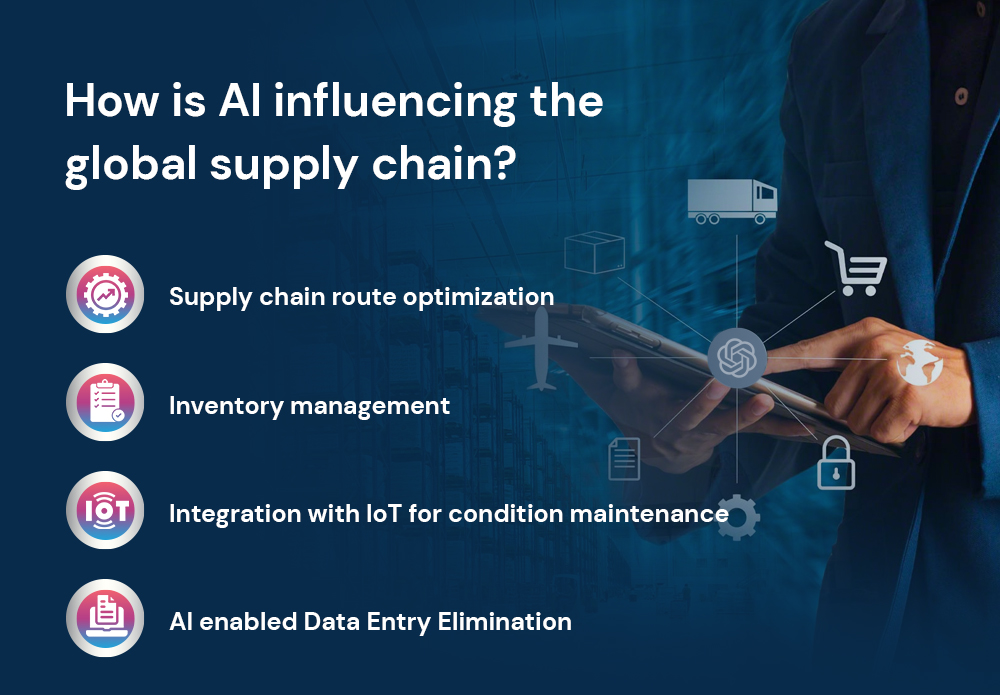
01. Supply Chain Route Optimization
Optimal planning between origin and destination is critical to the successful execution of any logistics assignment. And while doing that, they need to avoid obstructions that arise due to congestion to enable fast delivery.
Let’s not forget that people expect their products to be shipped immediately. They don’t care about obstacles you may face. They have paid already, and are expecting you to knock on their door any time now.
With the use of AI technology, transportation managers can find the optimum route for a shipment in a fraction of the time it will take for a human to do the same.
With AI’s prediction modeling ability, drivers and logistics coordinators can plan their journeys and make informed decisions about refueling and rest breaks. Moreover, AI can help to predict if and when maintenance is necessary to avoid breakdowns and subsequent delays.
02. AI is a game changer for inventory management
Supply and demand are the two fundamental pillars of any supply chain business. But to supply, one needs to predict the level of demand. This is no easy task, as demand refers to not just the current but also the future climate.
As such, decision-makers must constantly update their knowledge of market trends and customer behaviors while maintaining sufficient inventory. This includes preventing surpluses and minimizing waste.
Therefore demand forecasting is critical – it is what stands between your customer and your favorite competitor.
AI, with the help of big data and machine learning(ML), can iina Using AI-powered technologies, businesses can enjoy tireless surveillance of warehouses and inventories. And can help with procuring materials promptly due to timely notice.
03. AI-powered IoT devices can help to maintain materials in optimum condition
Whether it is raw materials or finished goods, whether they are stored in a warehouse or are being transported across the Pacific in insulated containers – continuous monitoring of their condition is paramount.
Some products may be fragile, and some sensitive to external temperatures. Making sure they reach the destination in a usable, working condition is non-negotiable. And it’s no easy feat.
This is where IoT devices such as sensors and trackers are useful. They can help you accurately and comprehensively monitor and notify you of environmental conditions such as temperature whether it be in warehousing and storage or transport containers.
Combining AI with IoT devices can take it to a whole new level. AIoT is advanced enough to do more than just track a shipment during each phase of transport.
By leveraging AI technology, companies can analyze vast amounts of historical data to improve real-time decision-making capabilities within their IoT networks and devices.
For example, when the refrigeration systems of cargo containers and warehouses reach unsafe levels, AI can be tasked to notify stakeholders on time, allowing timely action.
During the pandemic, the transportation of vaccines became an urgent need across the world. As such, logistics providers had to maintain optimum temperature to avoid vaccine spoilage. Using IoT and blockchain, healthcare providers and distributors were able to monitor and take action if and when the temperature changed from a safe range.
04. AI enables data entry automation
Cruising through the complexities of the supply chain means you have to process and analyze a vast array of data sources. Some fundamental documents that logistics business handle on a daily basis can include but is not limited to:
- Pro Forma invoice
- Commercial invoice
- Packing list
- Bill of lading (BOL)
- Certificate of analysis or certificate of inspection
- Insurance certificates
- Certificate of origin (C/O)
- Import and export licenses
- Inventory forms
Numerous data entry requirements mean loss of time due to manual data entry. But with the use of AI technology, you can streamline the data entry process. This is the perfect synergy between man and machine.
SFL‘s AI-powered OCR and RPA solution – CargoDoc helps freight forwarders automate and accurately enter data into CargoWise.
With a 98% accuracy, Cargodoc has helped our clients achieve a 90% cost reduction.
One of our clients saved 487 data entry hours using CargoDoc.
Here’s what happens to your data with CargoDoc:
- Upload the relevant document – via email, direct E-doc upload, or using a shared drive.
- Data will be extracted by our multi-step AI-powered algorithm.
Note: The software is not pre-designed to read templates. Which allows you to extract data from a range of versatile documents. - The extracted data will go through a human checkpoint.
The user-friendly validation interface lets you correct and control the accuracy. As such, Cargo is an OCR and RPA solution that keeps humans in the loop to ensure increased accuracy. - Validated data will be neatly organized into a standard structure and transferred to CargoWise, ready to be summoned at any time.
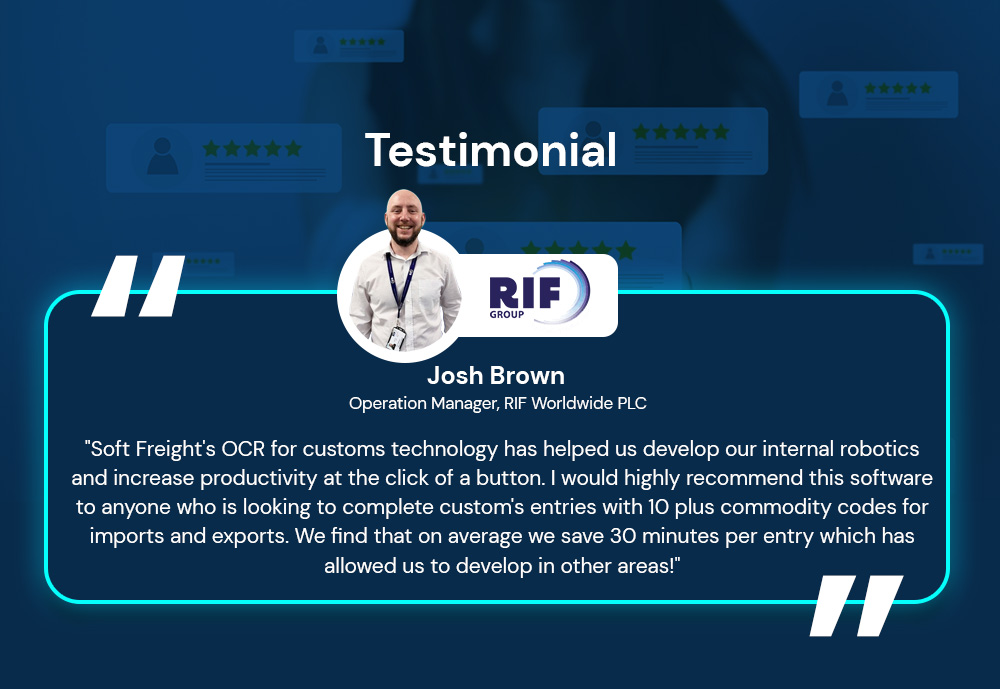
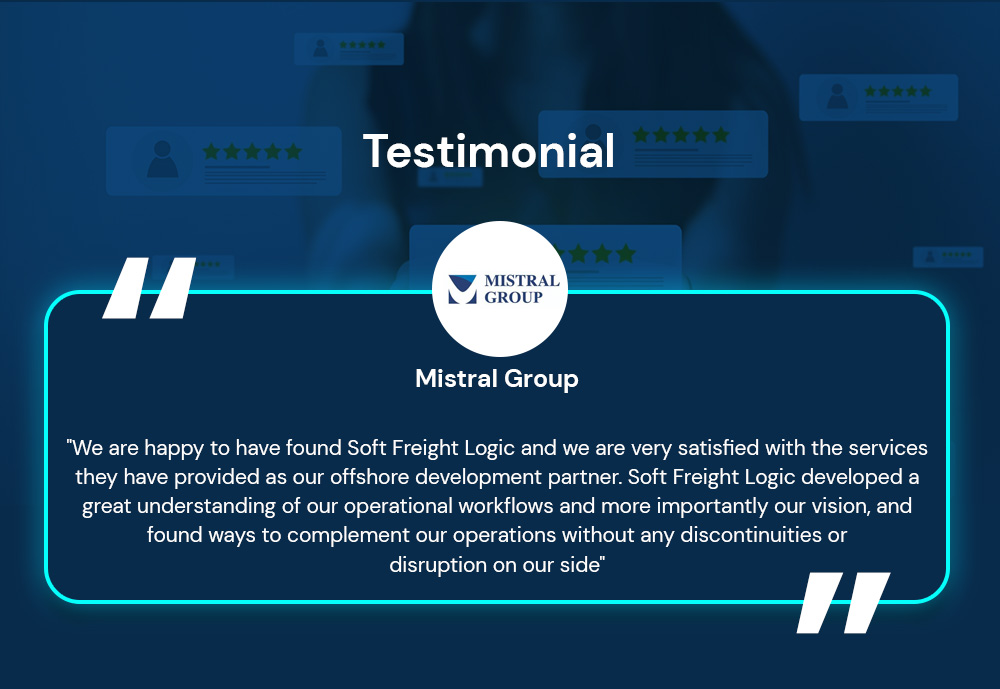
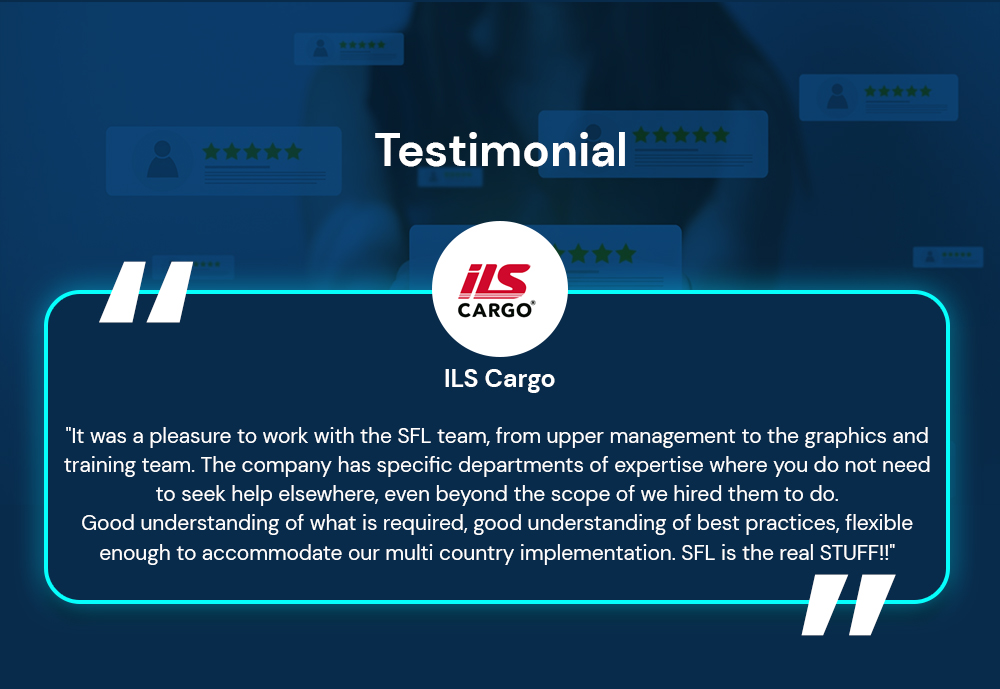
Do you want to save time across your supply chain system with this ground-breaking AI solution? Try this out:
You can calculate your potential cost reduction using the CargoDoc ROI Calculator and even book a product demo call with our Product Specialist Insha Fahim.
What is ChatGPT
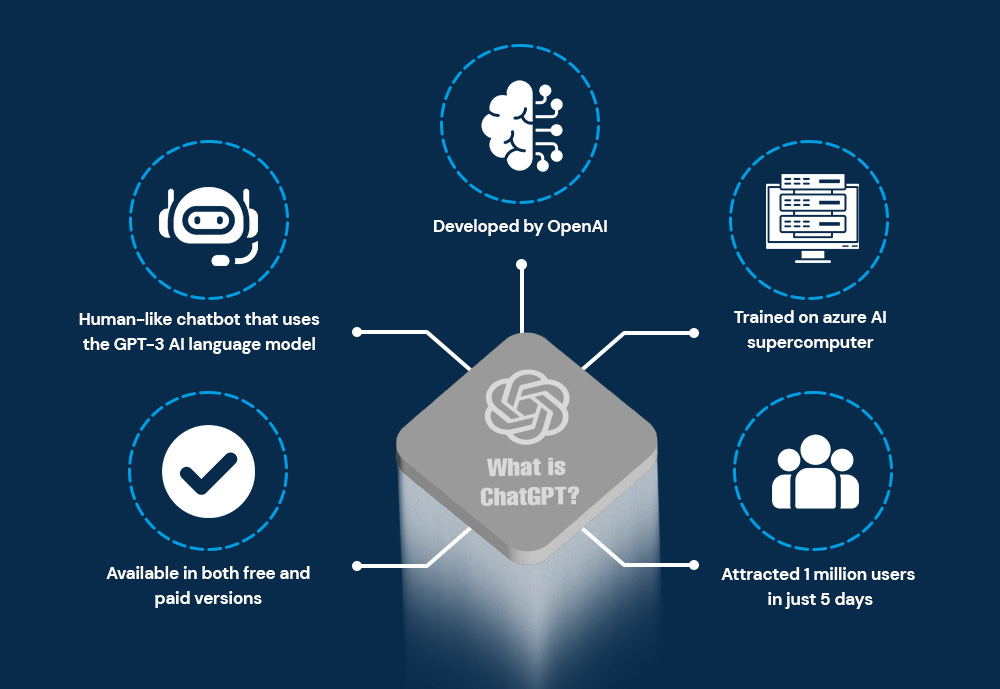
ChatGPT is a human-like chatbot that uses Generative Pre-trained Transformer 3 (GPT-3) – a large AI language model. It was developed by OpenAI, a research organization with a primary focus on advancing artificial intelligence.
ChatGPT was trained on an Azure AI supercomputer with a large text database from the internet. Including books, website text, Wikipedia, and other research articles – the data amounts to a whopping 570GB.
OpenAI had previously released DALL-E – an AI tool capable of generating realistic digital imagery from natural language descriptions. Otherwise known as prompts.
But after its introduction in November 2022, ChatGPT attracted 1 million users in just 5 days. As users from all walks of life experimented with the new AI – it became the talk of the internet.
Initially, OpenAI introduced ChatGPT as a research release. But users now have the option to subscribe to ChatGPT Plus – a paid version of the same with priority access to new features.
The free version is still publicly available. Though, unlike in the paid version, when its servers are at full capacity, you cannot access the chatbot.
How can the supply chain benefit from ChatGPT
ChatGPT is highly advanced compared to existing AI-powered languages because of its ability to interpret a query, understand user intent, and respond with relevance. While doing all that, it is continuously rendering itself better by using deep learning techniques.
ChatGPT can do everything AI has done so far but on a bigger scale. With sufficient training, it can assist with demand forecasting, supplier and vendor management, and route optimization to name a few.
However, the immediate enterprise use case for supply chain businesses will be the integration of ChatGPT into chatbots.
Customer service is a top priority for any business. Customer satisfaction affects profits and controls the fate of a product.
Chatbots are not novel – they have been deployed on websites and social media channels to interact with customers and answer their queries.
But those chatbots are boring because they are preprogrammed with specific keywords and can only generate limited responses. Good for frequently asked questions. But as a business, you cannot ignore rare or exceptional queries.
Here’s the thing about humans. They don’t always want to know the same thing as the other. Individuals may have different experiences with a product. And owing to distinct personalities and knowledge, expertise, and comprehension levels – their inputs or queries will also differ.
Since ChatGPT is prompt-based and can respond to unique user input, the conversation will be more natural and contextual. Moreover, it constantly learns and improves its responses based on feedback – which means the quality of service is constantly improving too.
Here are some of the other benefits of ChatGPT for customer service and support in the supply chain industry.
Benefits of ChatGPT for Customer Service and Support

- Round-the-clock availability – Humans need sleep and rest. AI does not. And this means less workload on the customer service team, reduced response time, and 24/7 availability for customers.
- Personalized service – ChatGPT can be trained to identify new or recurring customers and provide personalized support. Better customer satisfaction? Check. Increasing customer loyalty? Check.
- On-demand scalability – As businesses in the supply chain industry, you are probably well exposed to fluctuations in customer demand. Since ChatGPT can be scaled depending on the requirement, you can continue to support any volume of customer queries without compromising quality.
- Insightful – While interacting with customers, ChatGPT can also be trained to collect and analyze customer queries. It can identify common problems, trends, and patterns and provide insightful updates on customer preferences.
4 Limitations of ChatGPT: Why Businesses Need to Exercise Caution
ChatGPT is new and it is exciting to experiment with its capabilities. But it’s still an immature product in its initial stages. Therefore, integrating ChatGPT is not so simple, and businesses have to be cautious and beware of its limitations.
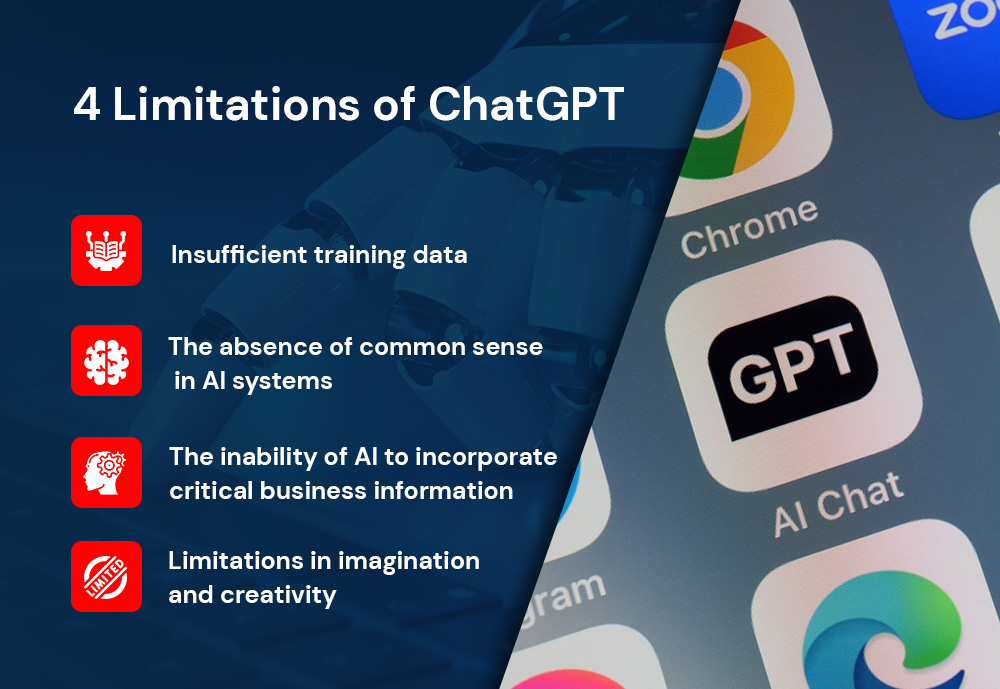
- ChatGPT is far from perfect due to its limitation in training data. It needs to be continuously trained to increase accuracy. Therefore, ChatGPT is capable of generating false information and can harm the reputation of your business.
- At its most basic level, ChatGPT is just codes and statistical patterns. It does not possess common sense, which is critical when dealing with stakeholders.
- Entering critical business data such as the company IP or customer information is unadvisable. Remember, ChatGPT is public, and you should engage with it as you would a public network. Safely.
- ChatGPT can understand, but it cannot imagine. It is advisable to avoid making business decisions based on the response given by a biased, and limited AI tool.
As leaders and decision-makers in the supply chain management industry, it is essential to adapt to change and make use of the latest technology. Businesses that continue to utilize traditional tools and manual mechanisms will risk losing their competitiveness.
Good leadership in this industry is vital for staying in the game. To learn more about how to better lead your team into the future, click here.
Book a free consultation call with us to learn how we can help you digitally elevate your SCM business.
